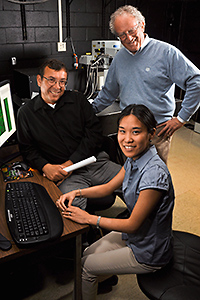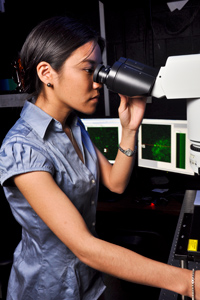
Students Beat the Clock
Innovative Program Prepares Students for Science of the Future

Vytas Bankaitis (left), Ken Jacobson (top), and Michelle Itano
While all who wander are not necessarily lost, Cell & Developmental Biology does not take that chance with its students. The program aims to ensure that students finish within six years. Vytas Bankaitis, the Chair of the department, says that students faced with no hard deadlines can sit in academic limbo.
“Sometimes graduate students will be in school for seven, eight or nine years,” Bankaitis says. “A six-year limit demands that the graduate student, the mentor and the committee understand that there’s a practical issue here: executing good science in a reasonable amount of time.”
The six-year time limit imparts a sense of urgency on the graduate student, but Bankaitis says that students like the term limit. It demands that they manage their time, science, and effort with an eye toward the finish line. The average student finishes the program in 5½ years, so it is not mission impossible.
To ensure six years is a realistic deadline for their projects, students make annual presentations about their accomplishments and which direction they wish to go. While this type of guidance might be expected, Associate Professor Con Beckers says many academic institutions leave students in the dark.
“At every other institution I’ve been except Carolina, students typically aren’t guided particularly well,” Beckers says. “For two or three years, they’re left to meander in an intellectual fashion all over particular areas of research and are not forced to sit down and focus on anything.”
In the six years, the students do more than focus just on research. While other programs have journal clubs that discuss published papers, the Department of Cell & Developmental Biology requires a mandatory grant-writing class that asks students to evaluate the science that will be conducted five years into the future.

Michelle Itano
“Grant evaluation really works all of the intellectual muscles required to solve problems,” Bankaitis says. “The real world isn’t so much about analyzing what happened so much as it’s projecting where one has to go.”
While writing may be the last thing a scientist thinks about, the students appreciate the class.
“The grant writing class was awesome,” says Michelle Smith, a 2008 graduate who is currently at Washington University in St. Louis working on a Postdoctoral Fellowship. “It was a realistic view of what our futures will be like. We saw what it means to write a grant and all the work that goes into that.”
Forward thinking and the six-year time limit prime Carolina’s Cell and Developmental Biology students for life after graduate school.
“I am learning to think like an independent researcher; to evaluate the field, identify a specific scientific issue, and develop and implement an effective way of contributing novel research findings to that area,” says Michelle Itano, who is in her third year of the program and plans to graduate in 5½ years. “I believe that‘s key in today's global scientific community.”
♦ Brian Conlin


